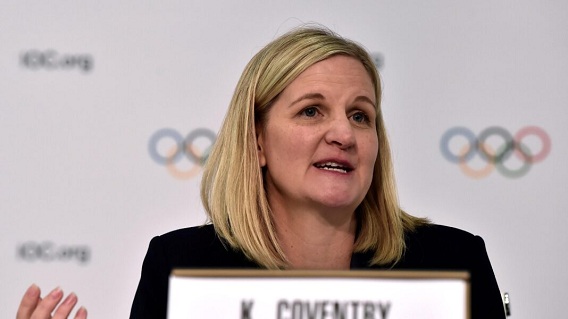The International Olympic Committee has moved a step closer to introducing a blanket ban on transgender women from female categories across all sports.
IOC president Kirsty Coventry vowed to bring in the policy as part of her election campaign, and set up a working group on the protection of women’s sport.
The IOC said that the review is “continuing its discussions on this topic and no decisions have been taken yet”.
However, after a presentation by its medical chief, sources have told BBC Sport told that a ban is likely to be introduced in 2026.
The chances of a similar change in approach over athletes with differences in sex development (DSD) is said to be less clear.
Last week, the IOC’s medical and scientific director Dr Jane Thornton updated its members as the organisation works through the details of the potential move.
As first reported by The Times, she revealed that initial findings of the science-based review suggested that athletes born male retain physiological advantages, even after reducing testosterone levels, fuelling expectations of a new policy.
BBC Sport has been told any blanket ban is unlikely to be introduced before the 2026 Winter Olympics, but could be brought in before the Los Angeles Games in 2028.
Back in March, former swimmer Coventry – a seven-time Olympic medallist – told BBC Sport that the IOC must “play a leading role” in discussions in this area, hinting at a major shift in approach.
The IOC has previously left sex eligibility regulations to the governing bodies of individual sports, rather than applying a universal approach, with many allowing transgender women athletes to compete in female competition if they lowered their testosterone levels.
After being elected, Coventry said a working group on the issue made up of experts and international federations would “ensure that we find consensus”.
She added that IOC members had shown “overwhelming support” to protecting the female category in sport.
Earlier this year, the president of the International Paralympic Committee said he is opposed to “blanket solutions” for transgender participation policies.
Transgender athletes in sport
In recent years a growing number of sports federations have barred athletes who have undergone male puberty from competing in elite female competition amid concerns over fairness and safety, including World Aquatics and World Athletics.
The moves have been opposed by trans rights campaigners who argue they could violate human rights, and insist inclusion should be prioritised.
This year, US President Donald Trump signed an executive order that prevents transgender women from competing in female categories.
He said it would include the 2028 Olympics in Los Angeles and that he will deny visas for transgender athletes trying to visit the US to compete at the Games.
Previous controversy
New Zealand’s Laurel Hubbard became the first openly transgender women to compete at an Olympics after being selected for the women’s weightlifting team at Tokyo 2020.
Hubbard, who failed to record a successful lift in the women’s +87kg category, had competed in men’s events before coming out as transgender in 2013.
Dr Thornton’s presentation also covered recent approaches to athletes with DSD. This is a term for a group of rare conditions, whereby a person’s hormones, genes and/or reproductive organs may be a mix of male and female characteristics. Some can be born with external female genitalia but functioning testes, and are often certified as female at birth and raised as such.
Both World Athletics and World Boxing have introduced genetic sex screening this year, claiming it is needed to protect the integrity of women’s competition.
The Paris 2024 Olympics were engulfed in controversy after Algeria’s Imane Khelif won the women’s welterweight boxing gold medal, a year after being disqualified from the World Championships for reportedly failing a gender eligibility test.
The IOC cleared the 25-year-old to compete – along with Taiwan’s Lin Yu-ting, who was also banned by the suspended International Boxing Association (IBA).
The IOC said competitors were eligible for the women’s division if their passports said they were female.
Both fighters said they were women, had always competed in the women’s division, and there was no suggestion they were transgender.
Some reports took the IBA saying Khelif has XY chromosomes to speculate that the fighter might have DSD, like runner Caster Semenya. However, the BBC was not able to confirm whether this is or is not the case.
BBC





